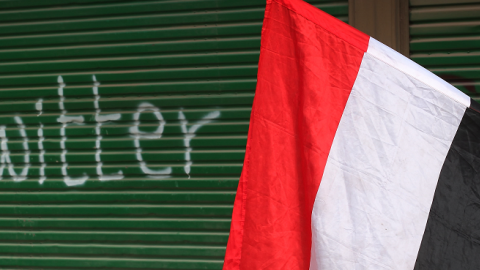In the debate about whether supporters of groups like Islamic State should be legally banned from social media, one argument runs that having material out in the open allows law enforcement to monitor Islamic radicals and those cheering on acts of terror. But online manifestations of terrorism can kill. Facebook and Twitter users in places like Libya, Syria, Iraq and other countries with no rule of law are especially vulnerable. Social-media postings can lead to assassination, which is followed by online gloating and used to threaten other individuals.
Last month in Libya, for instance, people who were using Facebook in the struggle for democracy and peace were being picked off by others who stalked them online. On Sept. 20 in Benghazi, 14 people were assassinated, including civil-society activist Tawfik Bensaud, whom I first met in 2011 when he was 15. By 2014 Tawfik was a nationally known organizer and speaker. So even in a city accustomed to several assassinations a week, the deaths of Tawfik and his 17-year-old co-worker Sami El-Kawafi —who were shot in their vehicle—were shocking.
No one took responsibility, but it was widely assumed that Ansar al Sharia—the terror group in eastern Libya—was behind Tawfik’s killing and many others. Ansar al Sharia was implicated in the murder of Ambassador Chris Stevens during the Sept. 11, 2012, attack on the U.S. mission in Benghazi, and designated as a terror group by the U.S. in 2013.
On Sept. 21, I received a Facebook message from a Libyan friend, a cousin of Tawfik.
“Hey Ann, i want to ask if there is any chance to know who is behind a Facebook page! Some fake page is threatening people. The same account threatened Salwa Bugaighis —and now threatening Fatima L.”
Salwa, a well-known Benghazi civil-society activist whom I also knew slightly from reporting in Libya, had been murdered in her home on July 25, just hours after posting on her Facebook page the names of three men assassinated the day before. Her death also was assumed to be the work of Ansar al Sharia.
The Facebook account that Tawfik’s cousin wrote to me about was under the name of Sufian bin Qamu, the name of the self-proclaimed Ansar al Sharia “emir” of Derna in eastern Libya. A former Guantanamo detainee who was implicated in the Benghazi attack that killed Ambassador Stevens, bin Qamu is also a “specially designated global terrorist” as of a Dec. 31, 2013, order signed by Secretary of State John Kerry . Regardless of whose account it is, Facebook shouldn’t have allowed someone using this name to open one in the first place.
Soon after Tawfik’s murder last month, the Sufian bin Qamu Facebook account left a post on Tawfik’s Facebook page proclaiming his killing a good thing. On his own page, “Sufian” also threatened a Benghazi woman with death for not wearing a head scarf.
Two days later, I emailed a public-relations person at Facebook about the Sufian bin Qamu account. She replied to me that day, and about 24 hours later the account vanished from Facebook. So far it hasn’t resurfaced.
Twitter has also been used to make open or veiled threats. Another seven people were assassinated in Benghazi on Sept. 27. On Sept. 29, Tawfik’s cousin told me about a Twitter account that had threatened one of her friends, with the words, in Arabic, “you better watch what you say or you will follow your friend,” apparently a reference to Tawfik.
The account specialized in gory beheading and battlefield photos and exhortations to readers to kill unbelievers. I reported it by tweeting to @safety, a Twitter address for reporting dangerous content. Twitter, used in the past by Islamic State to distribute beheading videos, did suspend the account. But a suspended user can return—and indeed this one has come back.
It would be impossible for any host site to shut down all accounts used to make terrorist threats or to incite murders. But current efforts, especially at Twitter, are not effective. A Facebook spokesman, who asked not to be identified, told me on Monday that Facebook prefers to focus on making it as easy as possible for people to report forbidden content, which is then reviewed by humans—rather than rely on algorithms to cut content off at the source.
Twitter seems to assume that its users live in a place like San Francisco. Its online support (#whatshouldido) suggests that users who “receive a violent threat” should “contact law enforcement.” In a lawless city like Benghazi, this reads like a cruel joke.
Much of the threatening online activity by Islamic State and other jihadists could be eliminated with common-sense measures, such as checking account names against lists of al Qaeda figures and designated terrorists. Online hosts could refuse to take accounts with Islamic State, or ISIS, and other names popular among terrorists and their supporters. Until steps like that are taken, we can expect to see brave men and women in Libya and elsewhere pay with their lives for using social media.



















